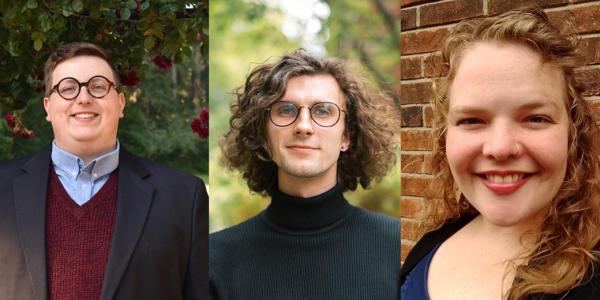Department of Music Lecture: Tad Biggs, Jacob Cupps, Lisa Mumme (graduate student conference practice session)
Sampling(,) Earthseed: Butlerian Themes and Dynamic Musicopoetics in Two Collaborative Works by Nicole Mitchell
Jacob P. Cupps, Ph.D. student in Music Theory
In this paper, I examine intertextuality in two works by the AACM composer Nicole Mitchell. I contend that on Mitchell's two 2020 collaborative albums—EarthSeed with vocalist Lisa E. Harris and Offering with electronic composer Moor Mother—references to works by the Afrofuturist author Octavia E. Butler give rise to musical and poetic structures. Michell and her collaborators reference Butler’s works in a variety of ways, often generating new layers of meaning by “Signifyin(g)” (Gates 1988) on Butler’s texts.
Earthseed, the fictional religion of Butler’s two Parable novels, explores core tenets of change and adaptability through a poetics that develops according to a reflexive, aphoristic logic; this communicative mode becomes a point of reference for Mitchell and Harris on EarthSeed. Instead of developing lines of poetry that appear directly in Butler’s texts, the two Signify on Butler by adapting her poetics to text and music. A close reading of the album’s third track, “Biotic Seeds,” illustrates how change is manifested in both spoken dialogues and group improvisation, and thus demonstrates how Mitchell and Harris re-narrate Earthseed’s core tenets to the listener in a new medium. The site of reference on Offering I explore is more direct: Mitchell and Moor Mother Signify on Mitchell’s other collaboration through sampling. On the track “Prototype Eve,” Moor Mother composites textual dialogues from “Biotic Seeds,” thereby creating her own new poetic reading. In so doing, she and Mitchell reshape these poetics to bring Butlerian worldbuilding into a new Afrofuture—one coordinated with Moor Mother’s own textual program.
Jacob P. Cupps is a PhD student in music theory at Washington University in St. Louis. Jacob’s research typically focuses on the aesthetic and technical manifestations of “undergroundness” in postmillennial hip-hop broadly and, in particular, on musicians involved with the Backwoodz Studioz label and the Ruby Yacht collective. Today’s paper represents a slight departure by focusing on similar musical techniques as explored by musicians involved with the Association for the Advancement of Creative Musicians within the last 10 years.
Do Not Listen!: The Witch's Threatening Vocality in American Horror Film
Lisa Mumme, PhD candidate in Musicology
Vocality, especially musical vocality, is central to the depiction of witches, standing in for their power and identity. Whether the witch threatens the patriarchal order with her abjection or transfixes the hero as a romantic object, the voice is central to her Siren-or-Muse function. The witch's voice threatens or seduces by penetrating the too-open ear. Therefore, the witch's voice is a central aspect of her power because of the threat of the voice to the ear.
I demonstrate the witch's powerful musical voice through a summary of data from 130 films from 1927 to present, offering a broad assessment of the musical and gendered work of witch vocality. Having established this claim, I offer two contrasting film case studies. Veronica Lake's Jennifer in I Married A Witch (René Clair, 1942) demonstrates many of the classic hallmarks of witch vocality as she embodies both the threatening and the romantic witch. Jennifer casts her spells primarily by singing them, and first appears in the film incorporeally, by her voice alone. In contrast, the witchy vocality in The Witch (Robert Eggers, 2015) departs from direct connection to the body of the witch in the narrative and signals her threatening presence from the underscore. These non-diegetic feminine voices are unmoored from the physical bodies of any characters but nonetheless signal the identity and power of the threatening witch. Listening to the witch's voice provides an analytical avenue to consider the aesthetics of feminine power that springs from a source outside the patriarchy and how that power is variously liberated and contained.
Lisa Pollock Mumme studies gender and sexuality in music. She primarily works on film music, particularly in science fiction and horror genres. Lisa holds an MA in musicology from the University of Iowa. As a PhD candidate at Washington University in St. Louis, Lisa concentrates ongender and sexuality in horror film music. Lisa has published her work on Mexican soprano Ángela Peralta (1845-1883) in The Opera Journal.
A 'Metabolic, Sociological' Reading of Julia Perry's Stabat Mater
Tad Biggs, Ph.D. student in Musicology
Tad has been invited to give a talk titled "A 'Sociological, Metabolic' Reading of Julia Perry's Stabat Mater" as part of the Julia Perry Centenary Celebration & Festival, taking place in New York City from March 13-16, 2024. He will discuss the Stabat Mater and a selection of Julia Perry's unpublished writings. Presented by Experiential Orchestra and Videmus, the festival celebrates the brilliance and legacy of Perry’s music through four days of concerts, talks, readings, and more. For more information, see JuliaPerryFestival.com
Tad is a Ph.D. student in music at Washington University in St. Louis. He studies music of the United States, particularly the lives and works of African American composers. Tad is a Lynne Cooper Harvey Fellow in American Culture Studies at Washington University in St. Louis.

